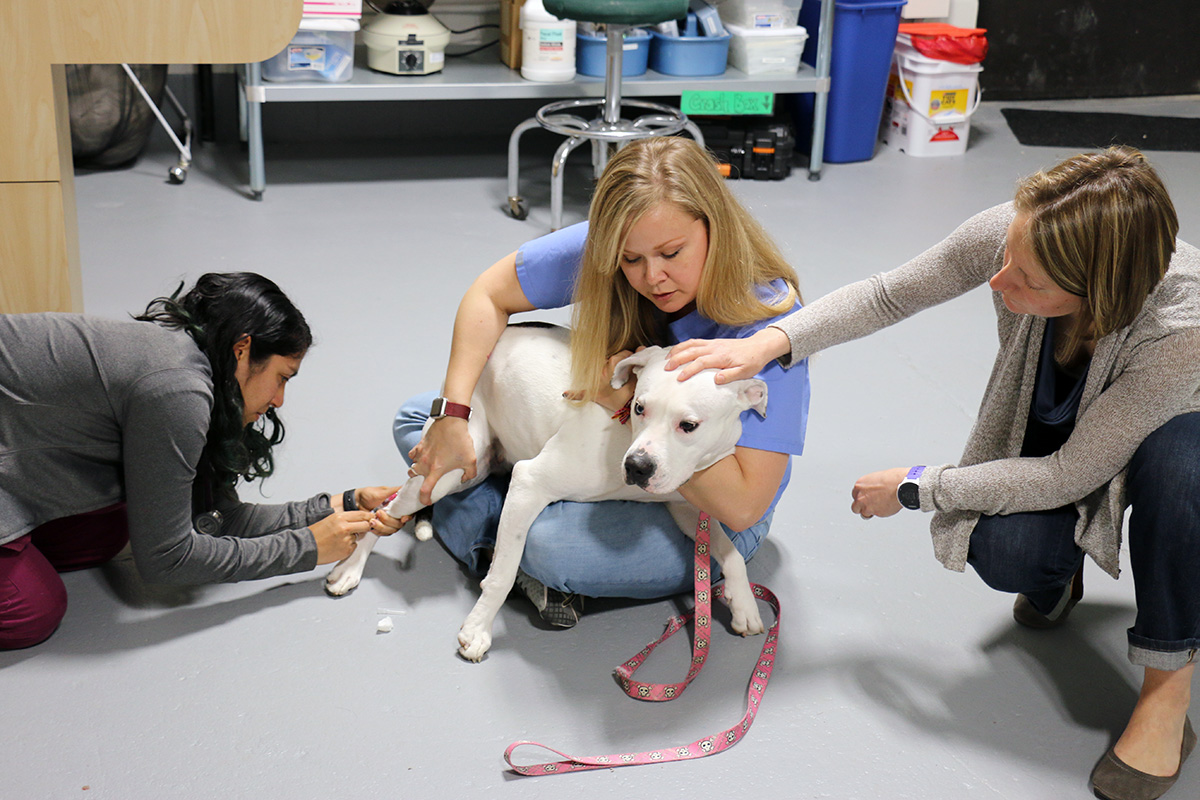

Veterinary technicians deserve to be recognized for their integral roles in advancing animal health. Regardless of species, they bring wholehearted compassion and technical expertise to every aspect of veterinary care, whether assisting with procedures or administering treatments. At UW Veterinary Care, veterinary technicians also play an essential role in teaching fourth-year students, other technicians, interns and our clients.
To celebrate National Veterinary Technician Week (Oct. 17-23), we spoke with three veterinary technicians at the UW School of Veterinary Medicine – Sarah Harnden, Amanda Anderson and Katie Harmelink – about their experiences. Harnden works with the small animal hospital’s Emergency and Critical Care Unit. Anderson found her place in the Morrie Waud Large Animal Hospital. And Harmelink, previously with the large animal hospital, transitioned to serving as an instructional specialist with the school’s Department of Medical Sciences.
UW SVM: Why did you decide to go into the veterinary technician field?

Sarah Harnden: Truthfully, I landed in the veterinary technician program on a whim due to a series of life events and circumstances. I always wanted to work with animals but I thought it would be centered around wildlife. In the end, I feel very fortunate and fulfilled to work with companion animals and their owners.
Amanda Anderson: I believe the basic answer to this question is because of the love we have for animals. Which is true for all of us. I’m a large animal technician at UW Veterinary Care and I’ve been around horses and cattle a majority of my life. I wanted a better understanding of how they worked internally as well as in a hospital setting and I get that here every day. I also wanted a challenge. Working with animals that are two or three times your body weight with high fight or flight responses is extremely challenging. It makes coming to work… interesting.
Katie Harmelink: I absolutely fell in love with the nursing care part of the job. I got my bachelor’s degree from UW-Madison and started at the teaching hospital as a student assistant, but quickly realized that nursing was the calling for me. Things like pulling blood, placing nasogastric tubes on colicky horses, and coaching students to succeed in placing catheters or other clinical skills just brought me so much joy.
What is the most rewarding part of your work?
SH: Every day I get to be an advocate for those who cannot speak for themselves. Animals deserve as much compassion, respect and humanity as we do. To be able to help them, no matter how big or small the act, is very rewarding.

AA: It’s hard to pick one or two things. But I’d have to say that working with patients who aren’t doing the best when they come in and working with the best veterinarians to get them back to where they can go home to their loving owners or go back to being top-notch performers – that’s rewarding in and of itself.
KH: I have a lot I love about my work. When I was in the clinic, I found the most rewarding was when we had very critical patients go home happy and healthy. The foals (baby horses) were the most intense and most rewarding when they nursed their mom for the first time after hours and hours of nursing care! Today, I do less in the clinic but find just as much, if not more, reward in watching our students learn and succeed in their education to become veterinarians. Being able to provide students with such great hands-on learning opportunities and watching them grow as veterinarians is so rewarding… I am lucky enough that I see them throughout each year of vet school! From meeting them at orientation and their first year, when everything is new and exciting, throughout the second and third year where the pieces start to come together. As they enter their fourth year, I watch their confidence and knowledge grow in the clinics, becoming amazing veterinarians ready for their next journey.
What general advice do you have for those with animals?
SH: Be kind and patient to your veterinarian and veterinary staff. As a technician working in the ER/Critical Care Unit, right now we are experiencing unprecedented stress and exhaustion due to the high number of pets seeking our care while we are often understaffed. We want to help everyone who brings their pet in for care but please know it may take more time.

AA: Don’t hesitate to call your veterinarian. Even if you think it’s something small and insignificant. That’s what your veterinarian is there for. It’s always good to have handy a stethoscope and thermometer in your stable, farm or home and a piece of paper stating what normal vital signs are for the animal you’re raising. That way, you are better prepared to answer your veterinarian’s questions when you call.
KH: My advice is your veterinarian works hard for you and is human also. Please be kind and communicative with them. They understand most situations and are there to keep your animal as healthy as they can. It’s a team effort.
Alisyn Amant